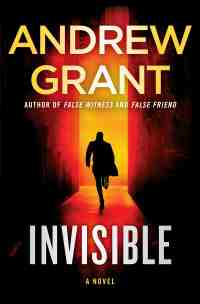
Published by Ballantine Books on January 8, 2019
Invisible is another human trafficking novel, the haven of thriller writers who can’t concoct a fresh plot. Paul McGrath is the kind of thriller hero who can’t stop telling us how great he is. He doesn’t overlook any injustice, he won’t tolerate people who dishonor a military uniform, yada yada. I just didn’t like the guy, making it difficult to build enthusiasm for the story he tells. Readers who like characters like McGrath will probably like the book, because parts of the story will push their thriller buttons.
McGrath is a working-class hero who calls himself The Janitor. He’s cleaning up the city’s streets — get it? The Janitor? McGrath starts the novel as part of Military Intelligence (and we know what George Carlin said about that!). He’s suspected of a crime, so he quits the military and returns to the States to make peace with his dad. Part of the conflict might have stemmed from McGrath’s father telling McGrath that he was a psychopath who should seek treatment (McGrath joined the Army instead).
McGrath’s good intentions are foiled when he learns that his father died right after an argument with a business partner who was defrauding the business. A nitwit prosecutor charged the business partner with homicide on the theory that the stress of the quarrel caused a heart attack due to a previously undiagnosed health condition. Andrew Grant apparently believes that’s a valid homicide theory, but even the most zealous Manhattan prosecutor would be too overworked to pursue such a nonsensical charge.
The prosecutor’s fraud case against the business partner tanked when files containing the evidence went missing. (Although the evidence consists of documents, the prosecutor doesn’t think she can prove the case with copies, which again demonstrates that she is a nitwit or that Grant doesn’t understand much about evidence.) McGrath learns that evidence has also gone missing in other cases. He makes it his mission to learn why.
McGrath takes a job as a courthouse janitor so he’ll have access to places where files might have been stashed. Since people are searched on their way into a courthouse, not on their way out, there’s no reason to stash the files where they might be found as opposed to taking them to a distant location and burning them. Still, McGrath is convinced that playing janitor will solve the mystery. That plot thread is only partially resolved because Grant wanted to set up a sequel.
While snooping around the courthouse, McGrath stumbles upon evidence of other possible crimes that he reports to the police, making a nuisance of himself when they fail to prioritize his reports. Naturally, he takes it upon himself to solve the world’s problems, which is smart because searching the courthouse while sweeping floors would have made for a less-than-riveting plot.
Some of McGrath’s plans to solve problems are just preposterous, but the whole story is pretty silly. So is McGrath. Like most action-thriller heroes, McGrath has utter contempt for bosses who (like most action-thriller writers) have never spent “time in the field.” Grant coughs up other reliable clichés: McGrath doesn’t “play by the rules”; McGrath had a sensei; McGrath tells war stories that, in his view, impart profound lessons; McGrath defeated countless terrorists when he was a military spy; McGrath drinks regular coffee with “nothing foamy in it” because he’s a regular guy; thriller heroes hate New York slumlords and Russian gangsters; thriller heroes who served in the military (didn’t they all?) are superior to people who didn’t. McGrath also follows the mold of thriller heroes who are appallingly self-righteous. And he plays an action role alongside the police, even though he’s not a cop, which would never happen in the real world.
The second half of the novel contains quite a bit of backstory regarding the bad guys. Lacking the Janitor to bring down the plot, that section of the book is actually pretty good. Grant’s writing style is serviceable, so Invisible is not painful to read. Fans of clichéd action heroes might enjoy it. Other thriller fans can easily find better choices. Clearly Grant has another Janitor novel in mind, but I'll be skipping it.
RECOMMENDED WITH RESERVATIONS